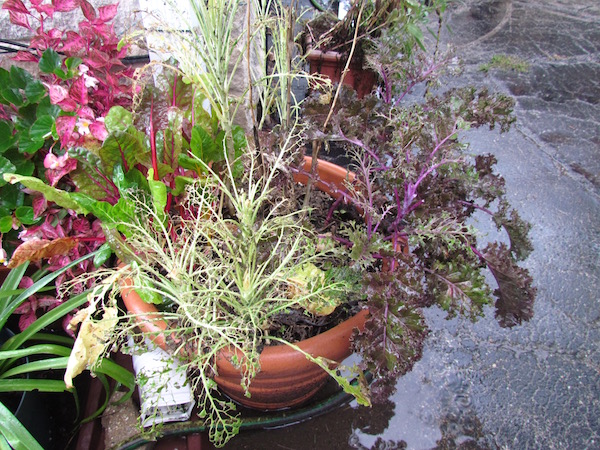
Cross-stripped cabbage worm dines on kale. (C) Jo Ellen Meyers Sharp
A caterpillar I didn’t recognize decided my kale was mighty tasty. In a matter of a couple of weeks a bluish-yellow worm devoured everything but the stems and ribs of the leaves.
So I did what a lot of people do. Googled it. I typed in kale blue yellow worm and up came cross-striped cabbageworm, technically a larva. Amazing how that works!
I clicked on several links and most of what I found were southern references to this cabbageworm, such as info from Clemson University. Made me wonder if it was a newer pest in the Midwest, so I sent a few photos to Purdue University’s Plant and Pest Diagnostic Laboratory to confirm the identification. I also asked about rice-like items that adhered to the leaves, wondering if they were the eggs of parasitic wasps, natural predators of certain caterpillars.
“These are indeed the cross-striped cabbageworm. We see them fairly commonly,” said Purdue entomologist Rick Foster.
The more familiar white cabbage moth flits from cabbage, kale, Brussels sprouts, mustards and other members of the Brassica family depositing a few eggs at each stop. The brown cabbage moth of the cross-striped cabbageworm lays its eggs on a single plant. The result is a plant being devastated, such as the one in the photo I submitted, he said.

The cross-striped cabbage worm moth deposits eggs on one plant. When the larvae hatch, they devour the plant. (C) Jo Ellen Meyers Sharp
“The cocoons are wasp parasites, (which) probably have dropped off the larvae,” Foster said. The wasp eggs hatch and the larvae eat the caterpillar from the inside out.
I donned gloves and picked off the cross-striped cabbageworms and squished them. The hope was to reduce their numbers before I planted up fall pots with ornamental cabbage and kale.
The Purdue lab is a tremendous resource for Indiana gardeners. You can mail whole plants, roots, leaves, buds or flowers to the lab for identification of insect or disease problems. You can also send insects. The PPDL website provides instructions on how to submit samples. The fee is $11.
A little closer to home is the Marion County Master Gardener lab in the Purdue-Marion County Extension office in Discovery Hall at the north end of the Indiana State Fairgrounds. People can drop off plant or insect samples, 8 a.m. to 4:30 p.m., weekdays. Forms are on site for this free service.
Marion County Master Gardeners staff the Answerline, 317-275-9292, where you can call with questions. Lastly, you can send photos of plants or insects to marioncountymg@gmail.com for Master Gardeners’ help with identification and tips on what to do. These services also are free.